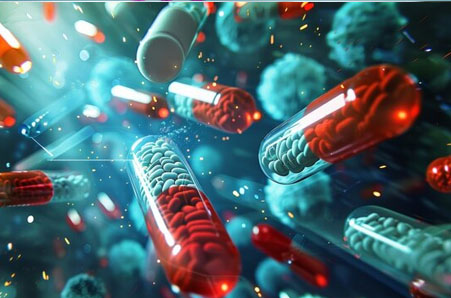Introduction to Antibiotic Resistance
Antibiotic resistance is a growing concern worldwide, posing a significant threat to public health. Understanding the mechanisms and implications of antibiotic resistance is crucial for effective healthcare management and treatment strategies.
Mechanisms of Antibiotic Resistance
Antibiotic resistance occurs when bacteria evolve mechanisms to withstand the effects of antibiotics. These mechanisms include:
- Enzymatic Degradation: Bacteria produce enzymes that deactivate antibiotics before they can exert their effects.
- Alteration of Antibiotic Targets: Bacteria modify their cellular structure to change the target of antibiotics, making them ineffective.
- Reduced Permeability: Bacteria develop mechanisms to reduce the uptake of antibiotics, minimizing their impact.
- Efflux Pumps: Bacteria use efflux pumps to expel antibiotics from their cells before they can cause harm.
Factors Contributing to Antibiotic Resistance
Several factors contribute to the development and spread of antibiotic resistance:
- Overprescription of Antibiotics: Inappropriate use and overuse of antibiotics can lead to the development of resistant strains.
- Incomplete Courses of Treatment: Not completing a prescribed antibiotic course allows bacteria to survive and develop resistance.
- Misuse in Agriculture: Antibiotics used in livestock and agriculture contribute to the spread of resistant bacteria through food chains and the environment.
- Lack of New Antibiotics: Few new antibiotics are being developed, limiting treatment options against resistant infections.
Consequences of Antibiotic Resistance
The consequences of antibiotic resistance are profound and far-reaching:
- Increased Morbidity and Mortality: Resistant infections are harder to treat, leading to higher rates of morbidity and mortality.
- Prolonged Illness: Patients with resistant infections may experience prolonged illness and hospital stays.
- Economic Burden: Treating resistant infections is costly due to longer hospital stays, more intensive care, and the need for newer, more expensive antibiotics.
- Global Health Threat: Antibiotic resistance is a global health threat that requires coordinated efforts to mitigate its impact.
Global Initiatives and Policies
Governments and international organizations are taking steps to combat antibiotic resistance:
- Antibiotic Stewardship Programs: Promoting appropriate antibiotic use in healthcare settings to reduce resistance.
- Regulation of Antibiotic Use in Agriculture: Implementing regulations to limit the use of antibiotics in food-producing animals.
- Research and Development: Investing in research for new antibiotics and alternative therapies to combat resistance.
Future Directions in Antibiotic Resistance Research
Ongoing research aims to address antibiotic resistance through various approaches:
- Development of New Antibiotics: Research focuses on discovering novel antibiotics with different mechanisms of action.
- Alternative Therapies: Investigating alternative therapies such as phage therapy and immunotherapy to treat resistant infections.
- Diagnostic Tools: Advancing diagnostic techniques to quickly identify resistant strains and tailor treatments accordingly.
The Role of Healthcare Providers and the Public
Healthcare providers and the public play crucial roles in combating antibiotic resistance:
- Education and Awareness: Educating healthcare providers and the public about responsible antibiotic use and the consequences of resistance.
- Patient Adherence: Encouraging patients to complete prescribed antibiotic courses as directed by healthcare providers.
- Infection Prevention: Implementing infection control measures to prevent the spread of resistant bacteria in healthcare settings and communities.
Case Studies in Antibiotic Resistance
Examining real-world examples of antibiotic resistance outbreaks and management strategies:
- Hospital Acquired Infections: Instances where resistant bacteria have spread in healthcare facilities and the interventions implemented.
- Community Outbreaks: Examples of antibiotic-resistant infections affecting communities and public health responses.
Ethical and Societal Implications
The ethical considerations and societal impact of antibiotic resistance:
- Equitable Access to Antibiotics: Ensuring fair access to effective antibiotics worldwide, especially in low-resource settings.
- Environmental Impact: Addressing the environmental consequences of antibiotic use and resistance in ecosystems.
Conclusion
Antibiotic resistance is a complex issue with profound implications for global health. Understanding its mechanisms, causes, and consequences is essential for developing effective strategies to combat this growing threat.
Summary Table
| Aspect | Details |
|---|---|
| Mechanisms | Enzymatic degradation, alteration of targets, reduced permeability, efflux pumps |
| Factors Contributing | Overprescription, incomplete courses, misuse in agriculture, limited new antibiotics |
| Consequences | Increased morbidity and mortality, economic burden, global health threat |
| Global Initiatives | Antibiotic stewardship, regulation in agriculture, research and development |
| Future Directions | New antibiotics, alternative therapies, advanced diagnostics |
| Healthcare and Public Roles | Education, patient adherence, infection prevention |
| Case Studies | Hospital acquired infections, community outbreaks |
| Ethical and Societal Impact | Equitable access, environmental impact |
FAQ
What causes antibiotic resistance?
Antibiotic resistance is primarily caused by overuse and misuse of antibiotics in human healthcare and agriculture, which allows bacteria to adapt and survive treatment.
How can antibiotic resistance be prevented?
Prevention involves promoting responsible antibiotic use, completing prescribed courses, and implementing regulations on antibiotic use in agriculture.
Why is antibiotic resistance a global concern?
It poses a significant threat to public health globally by reducing the effectiveness of antibiotics, making infections harder to treat and potentially leading to higher mortality rates.
What are the consequences of antibiotic resistance?
Consequences include increased morbidity and mortality rates, prolonged illness, higher healthcare costs, and a reduced ability to treat infections effectively.
What are efflux pumps in antibiotic resistance?
Efflux pumps are mechanisms used by bacteria to expel antibiotics from their cells, reducing the antibiotic’s effectiveness and contributing to resistance.
How is antibiotic resistance managed in healthcare settings?
Healthcare settings manage resistance through antibiotic stewardship programs, infection control measures, and promoting best practices in prescribing antibiotics.
What research is being done to address antibiotic resistance?
Research focuses on developing new antibiotics, exploring alternative therapies, and improving diagnostics to combat antibiotic-resistant infections effectively.

